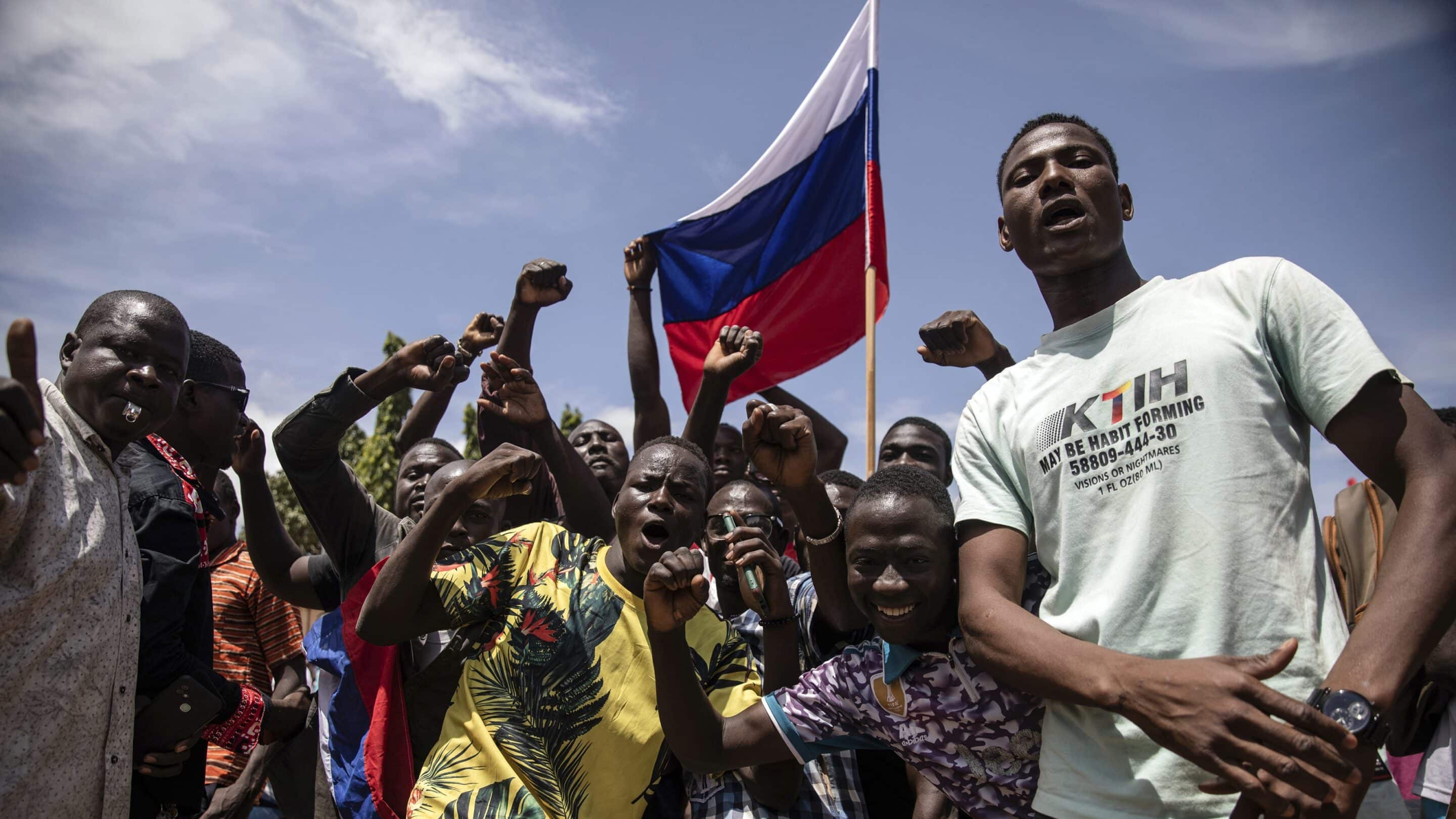Soldiers have seized power in Burkina Faso and Mali, setting back democracy as jihadists threaten security in West Africa.

Young men carrying a Russian flag chant slogans against France in Ouagadougou, Burkina Faso, 30 September 2022. (AP Photo/Sophie Garcia)
Waking up in the dead of night to the spitting of gunfire as soldiers and tanks line the streets may not be a typical experience.
But for residents of Ouagadougou in Burkina Faso and Bamako in Mali, armed coups have become increasingly common.
Since 2020, four military coups have taken place in the West African countries of Mali and Burkina Faso. Soldiers in both countries have risen up, lambasting the government over the poor treatment and management of the armed forces, corruption and their governments’ failure to handle the deteriorating security situation.
Burkina Faso and Mali both host rampaging jihadist groups affiliated with al-Qaeda and Islamic State that now occupy vast swathes of territory. According to a United Nations report, Mali controls as little as 15% of its territory, while West African regional bloc ECOWAS says only around 60% of Burkina Faso is under state control, due to the expansion of militants in recent years.
“The security situation played a huge role in these coups,” said Alex Thurston, assistant professor of Political Science at the University of Cincinnati. “In some cases, there was a direct link between individual attacks and the coups that followed.”
But Mali and Burkina Faso are not the only nations in West Africa experiencing an uptick in undemocratic transfers of power — Guinea witnessed a coup in 2021. There, Mamady Doumbouya seized power, lamenting that former President Alpha Conde had lost touch with the people after he amended the constitution in 2020 to remain in power for a third term.
In all three countries, the coups have been met largely with glee by populations increasingly frustrated over existing governance and desperate for a change that might improve their lot.
But the implications of the armed takeovers are not entirely positive, nor are they limited to West Africa or to the states where the coups are taking place.
Time may be running out for West Africa to fend off jihadist advances.
The Economic Community of West African States (ECOWAS), a regional bloc that includes all three of these countries, has been struggling to restore order and civilian rule, without significant success.
In both Mali and Guinea, the new rulers have resisted requests for shorter transitional timetables despite the imposition of sanctions, while ECOWAS has split over the best course of action to prevent further military takeovers.
Countries in West Africa are growing frustrated at the coup leaders’ unwillingness to cooperate with regional missions and collaborate adequately over security challenges. Without assistance from Mali, it has become harder to fight expanding jihadist movements that are increasingly encroaching on nations near the coast of West Africa.
Mali’s ruling junta withdrew from the regional G5 Sahel counter-terrorism force in June amid disputes with other members of the bloc, which it said were under the influence of France.
Without Mali’s input, these kinds of regional security efforts struggle to make much impact, given that the majority of jihadist groups have their strongholds in Mali.
Time may be running out for such collaboration to take hold and for West Africa to effectively fend off jihadist advances.
“Now, coup makers promise to fundamentally alter the security situation, and they can’t,” Thurston said.
Military coups have failed to stem jihadist advances.
Despite their stated intention to do better in tackling jihadist violence than their predecessors, coup leaders have typically done worse. In Burkina Faso, the number of civilians killed more than doubles between January, when former junta leader Paul-Henri Damiba took power, and September, according to the Associated Press.
Meanwhile, Mali has seen an increase in attacks near the capital, Bamako, since its 2020 and 2021 coups.
“While the coup leaders use the security situation as an excuse to generate support from the general public, the coups rather create division among security forces and therefore they lack the unity needed to challenge the growing threats by jihadists,” explained Rida Lyammouri, senior fellow at the Policy Center for the New South.
As jihadism has expanded in the Sahel, violence has also increased in coastal West African states, with Togo and Benin seeing a spate of unprecedented violence in the northern reaches of their countries in late 2021 and 2022.
The expansion of jihadism in West Africa is terrifying, not just for West Africans who have seen thousands of people killed and at least 1.5 million people displaced in Burkina Faso alone since 2015, but also for Europe.
The Sahel has become home to the world’s fastest expanding jihadist insurgencies and may yet become an area from which jihadist attacks are plotted in Europe.
Mali has replaced its French ally with Russia.
But the impact of the coups may go beyond immediate jihadist security implications. They may also be connected to a broader conflict between Russia and the West, which has escalated significantly since Russia invaded Ukraine in February.
Mali has become a noteworthy supporter of Russia since transitional president Assimi Goita took power in 2021 and fell out spectacularly with France.
France is Mali’s former colonial ruler, and there is significant anti-French feeling in Mali over Paris’s continued perceived interference in its domestic affairs.
Tensions boiled over in the aftermath of the second coup amid growing disillusionment over France’s failure, despite having deployed troops to Mali since 2012, to defeat jihadist groups, leading to the eventual withdrawal of French troops in August.
The acrimony remains, with Bamako now accusing Paris of working with jihadist groups to destabilise the Malian state.
Mali has replaced its French ally with Russia and is now working closely with Russian private military company Wagner Group. This is widely supported by citizens in Bamako, who protest regularly in support of Russia and against France and its continued influence across West Africa.
Similar sentiments exist in neighbouring Burkina Faso, where in September protesters threw projectiles at the French embassy and a French cultural centre in Ouagadougou and Bobo-Dioulasso, respectively, calling for the contingent of French special forces still based in Burkina Faso to leave.
Yet, support for Russia was widespread, with Russian flags lining the streets of Ouagadougou.
Burkina Faso’s new leader has pledged to work more closely with Russia.
Burkina Faso’s new interim president has pledged to rethink some of Burkina Faso’s security partnerships and to work more closely with Russia, something that some of the soldiers who overthrew the previous military leader said he had failed to do.
There is no proof that the most recent Burkina Faso coup or the previous ones in Mali were connected to Russia, despite Wagner stating publicly that it supports the coup leader in Burkina Faso.
“It’s a stretch to connect the coups to Russia’s involvement,” said Lyammouri. “Russia’s interest in the region cannot be denied, but before all this is domestic problems.”
Still, anti-France propaganda is widespread, while Wagner has allegedly been granted some access to mines in Mali in exchange for help in tackling the jihadist threat.
Some experts believe it is plausible that Russia is expanding its sphere of influence in West Africa and forcing France out, seeking to reduce Western power outside of Europe and to gain a buffer against Western sanctions for its invasion of Ukraine.
Although West Africans have long complained of French influence in the region, human rights abuses in Mali have multiplied since Wagner began operations there. A massacre of more than 300 civilians in the Djenné region in March has been attributed to Malian soldiers working with Wagner operatives, while sexual abuse claims are widespread.
The atrocities play into the hands of jihadist groups, who will find recruitment easier in communities marginalised and violated by the state, and who will ultimately likely be the main beneficiaries of the recurrent coups.
Three questions to consider:
- What are the reasons that military leaders have given for overthrowing civilian rulers in Burkina Faso and Mali?
- Why are the implications of the military coups not limited to West Africa?
- What is the Wagner Group?

Jessica Moody is a freelance political risk analyst and peacebuilding consultant focusing on West Africa. She has lived in Mali, Senegal and Cote d'Ivoire and written for the U.S. Institute for Peace's RESOLVE network, the U.S. Holocaust Memorial Museum's Atrocity Prevention programme, Foreign Policy magazine, S&P Global, Jane's, Torchlight Intelligence, World Politics Review, the Economist Intelligence Unit and the Financial Times. Moody has a PhD from King's College London, with research focusing on post-conflict peacebuilding in Cote d'Ivoire.
